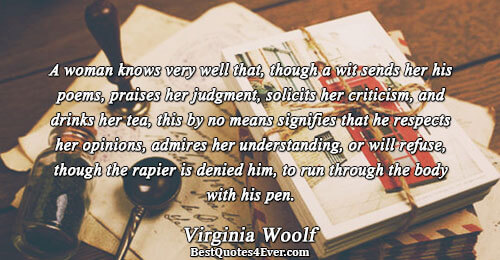
A woman knows very well that, though a wit sends her his poems, praises her judgment, solicits her criticism, and drinks her tea, this by no means signifies that he respects her opinions, admires her understanding, or will refuse, though the rapier is denied him, to run through the body with his pen.
Long before I became a feminist in any explicit way, I had turned from writing love stories about women in which women were losers, and adventure stories about men in which the men were winners, to writing adventure stories about a woman in which the woman won. It was one of the hardest things I ever did in my life.
I think women dwell quite a bit on the duress under which they work, on how hard it is just to do it at all. We are traditionally rather proud of ourselves for having slipped creative work in there between the domestic chores and obligations. I'm not sure we deserve such big A-pluses for all that.
When we combine very real workplace inequalities with these romantic opt-out stories, the idea that "having it all" is a laughable goal becomes enshrined as immutable truth. And when we portray opting out as a simple matter of "choice," we ignore the systematic problems that make combining work and motherhood so difficult.
Mother Atkinson thought that every one should have a trade, or something to make a living out of , for rich people may grow poor, you know, and poor people have to work.... so when I saw how happy and independent those young ladies were, I wanted to have a trade, and then it wouldn't matter about money, though I like to have it well enough.